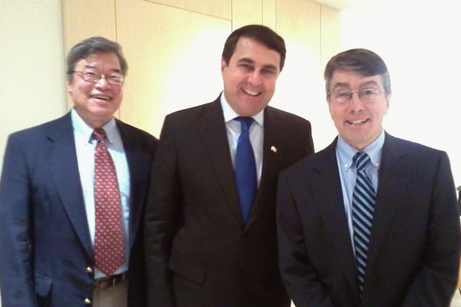Cornell to begin collaborative research in Paraguay
By Daniel Aloi

Cornell will work with an institution in the Republic of Paraguay to develop academic and scientific relationships, support collaborative research and facilitate international academic exchange.
President David Skorton signed a memorandum of understanding recently with Consejo Nacional de Ciencia y Tecnología (CONACYT) as a framework for cooperative programs.
Cornell and CONACYT intend to initiate efforts in research, development and innovation, promoting academic and cultural activities, sharing knowledge and training human resources.
“I am excited about the opportunity to work together with visionary people in Paraguay,” said Tim DeVoogd, director of the Latin American Studies Program (LASP), which will coordinate funding for CONACYT projects. “The projects proposed will benefit students on both sides, as well as help Paraguayans more broadly. For example, learning new ways to deal with mosquitoes that carry dengue fever will have a major impact on health. [Another project] will make Lake Ypacarai a resource for the country again and enhance it as a tourist destination.”
Initial projects to be developed include:
- Short courses in applied mathematics, computer science, engineering and physics, on topics for which there is little expertise in Paraguay. Courses would last two to three weeks and be taught by Cornell faculty members, in association with professors and engineers in Paraguay.
- Developing human and technical capacity in epidemiology, with a focus on dengue fever. Cornell graduate students in international epidemiology will provide training to Paraguayans, and equipment will be purchased and research projects will be funded to characterize the types and spread of dengue fever throughout the nation.
- Assessing the causes of pollution in Lake Ypacarai and developing a plan for remediation. Equipment will be purchased to monitor the lake, and Cornell will train four graduates (including graduate students) to work with Paraguayan engineers in carrying out assessment and monitoring studies.
- Developing software to model eutrophication and sedimentation in the lake behind Itaipu Dam. Data from direct measurements on the lake will be used to simulate its current and future status. Improved modeling software will be designed, to be used at other lakes within Paraguay and elsewhere in South America.
Five entities in Paraguay will work with Cornell to carry out specific projects and have appointed CONACYT via an inter-institutional agreement to coordinate activities between Cornell and each of the five institutions. They are: the Ministry of Public Health and Social Welfare, the Technical Secretary of Economic and Social Planning, the National University of Asuncion the Itaipu Technological Park, and Paraguay Educa.
The agreement allows for the addition of other projects in Paraguay to be determined.
“This new Paraguay initiative is an excellent example of what Cornell can achieve when we combine our expertise in the natural and social sciences and the humanities with strong local partners to address serious problems,” said Alice Pell, vice provost for international relations. “All of the projects reflect local priorities and are in areas in which Cornell has considerable knowledge.”
DeVoogd said that “this is the first and the template for what I hope will be a number of such agreements” with other countries.
Media Contact
Get Cornell news delivered right to your inbox.
Subscribe